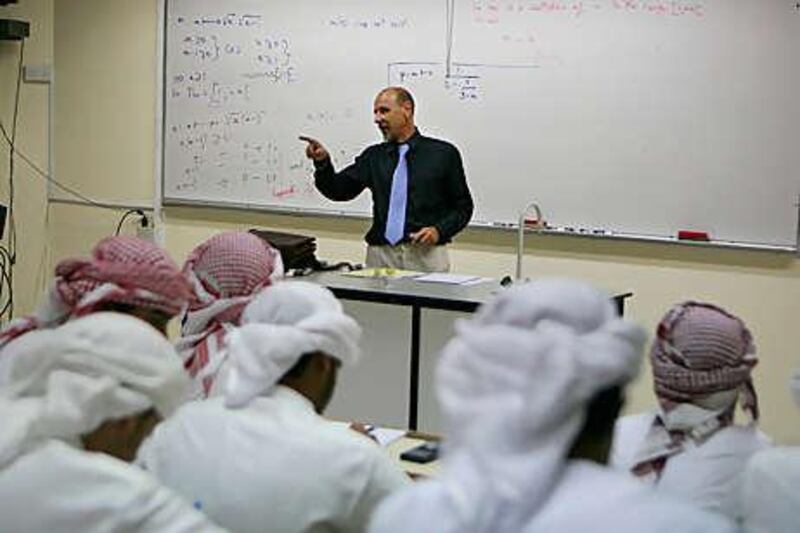ABU DHABI // The adoption of a universal regional standard of teacher training could have a serious impact on the country's predominantly Arab-staffed state schools, academics have warned. Government education officials have signalled they are to push for the adoption of higher standards to apply across the Middle East and North Africa (Mena) region, but the move has raised concerns among staff at schools and universities.
The push, led by the Ministry of Higher Education and Scientific Research and Zayed University, follows a 2007 World Bank report that called for better quality assurance in education in the Middle East. "Within a few years you're going to see major differences," said Dr Peggy Blackwell, the dean of the college of education at Zayed University. "Improving education is never going to happen overnight.
"It takes time. The teachers have to be brought up to speed." In 2009, acting on behalf of the Ministry of Education, officials from Zayed University approached the National Council for the Acreditation of Teacher Education (NCATE), an organisation that certifies teacher training programmes in the US, to request that they begin accrediting Arab universities. "There are a lot of teachers here who come from other countries and some of them are good," Dr Blackwell said. "Some have a degree in their subject but have never studied methods of teaching."
The ministry is pressing for the establishment of an NCATE centre at Zayed University, which would serve as the main office for the region. Together with other governments that sign up with NCATE, federal universities would then adopt a set of six standards for teacher training, as used in US universities. As well as requiring teachers to be proficient in their subject matter, the standards will stipulate that teaching courses must provide them with actual classroom experience.
Colleges must have adequate assessment systems and collect data on student performance to improve programmes. Course tutors must be qualified, and colleges must be adequately equipped. NCATE has spent the past year studying the situation in the Mena region. The NCATE board is to meet in October to review the feasibility study and determine whether to branch into the Middle East. Dr Boyce Williams, the vice president of international and Mena relations at NCATE, said the impact of the new standards was likely to be dramatic.
"Schools are going to see a different kind of educator going into the classroom," she said. "I think if 90 or 95 per cent of teachers are coming out of federal universities you'll see a difference." Dr Williams stressed the importance of outside quality assurance agencies such as NCATE. But the biggest hurdle for universities would be to develop connections with public schools, she said. "I don't see the partnerships with the schools that you would see in the States," she said.
Mohammed al Hammadi, the principal of the Al Baraq School in Al Ain, said he spoke for hundreds of others in his position across the country in backing the proposal to drive up standards in schools. "In countries like Egypt and Syria, they do not have modern schools like us," he said. "They do not have the same kind of education as what we want here now." klewis@thenational.ae






